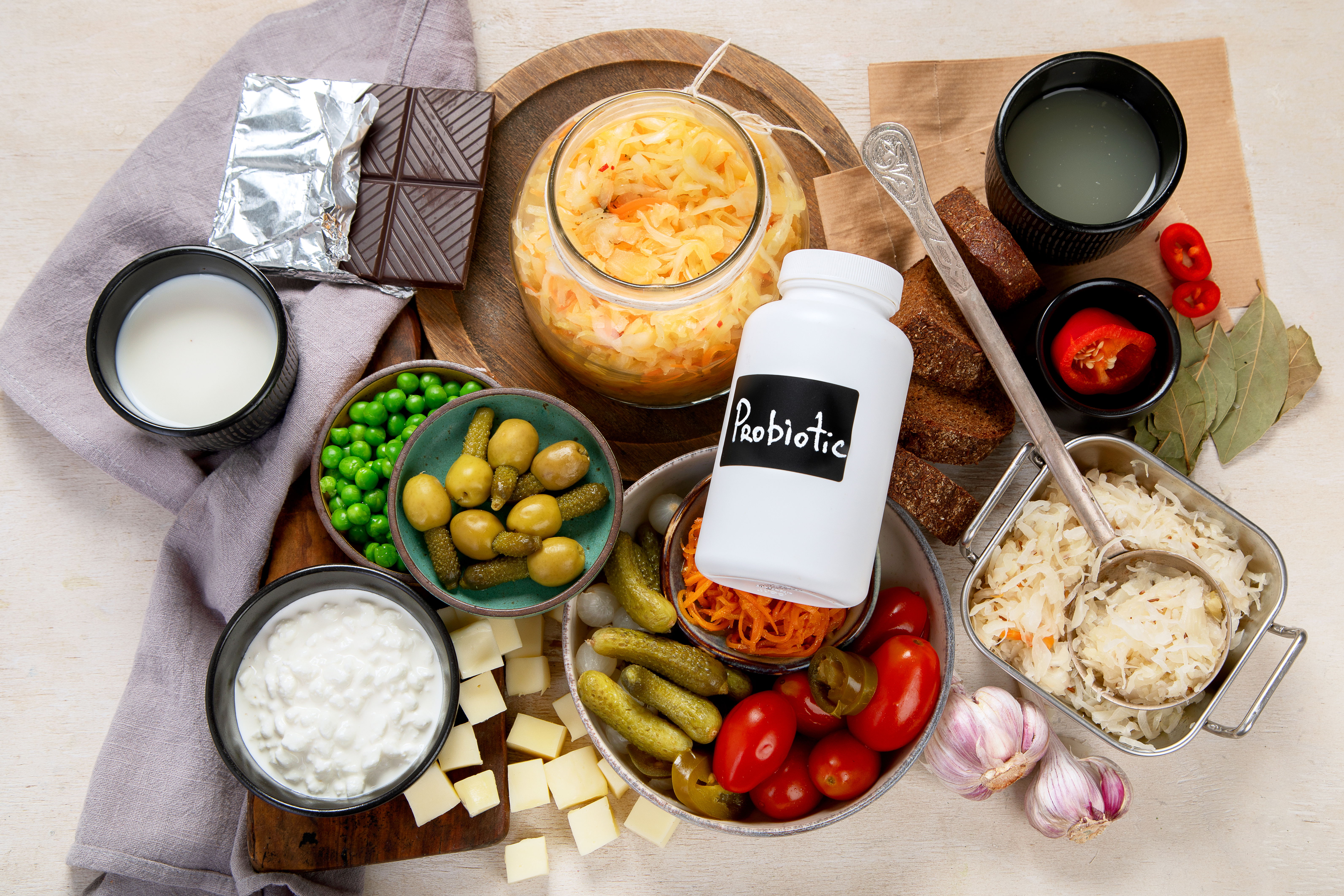Try These 8 Transformative Steps to Enhance Your Gut Health
Your gut microbiome is a vast community of trillions of bacteria and fungi residing in your gastrointestinal tract, significantly influencing your digestion, body weight, susceptibility to diseases like diabetes and cardiovascular disease, immune response, and mental health. Studies show that a rich and diverse gut microflora correlates with a reduced risk of diseases and allergies. Dysbiosis refers to an imbalance between beneficial and harmful microbes in your gut. While symptoms of an unhealthy gut microbiome vary, common ones include constipation, diarrhoea, bloating, acid reflux, fatigue, sleep disturbances, mood swings, anxiety, skin rashes, and unexpected changes in weight.
The great news is that by incorporating these 8 TRANSFORMATIVE STEPS into your daily routine, you can enhance your gut health.
1. Eat plenty of vegetable and fruits
Strive for five to seven servings of fruits and vegetables daily, which equates to about 30 different plant-based foods weekly. Embrace adventure and creativity in your diet.
Incorporate a spectrum of colours on your plate – greens, reds, oranges, yellows – to ensure a diverse intake of vitamins and nutrients. Each week, introduce one or two new plant-based foods into your cart that you don't typically purchase. For instance, exchange your regular green beans for mangetout peas, or if you habitually consume walnuts, give almonds a try.
2. Increase fibre intake
Fibre is a plant-based nutrient that stimulates the growth and diversity of beneficial bacteria in the gut. It is primarily found in fruits, vegetables, whole grains, and legumes.
There is increasing evidence that sufficient fibre intake benefits digestion and may reduce the risk of chronic diseases. Most carbohydrates, proteins, and fats are absorbed into the bloodstream before reaching the large intestine, providing little nourishment for gut microflora.
Fibre, however, is different. Human cells lack the enzymes needed to digest fibre, allowing it to arrive at the large intestine relatively intact. The intestinal bacteria possess the necessary enzymes to break down many of these fibres. This is why fibre is crucial for health; it feeds the beneficial bacteria in the gut.
3. Eat fermented foods
Fermented foods such as yogurt, kimchi, sauerkraut, and kombucha are highly valued for their ability to enhance gut health, owing to their probiotic content (live bacteria). Yogurt, in particular, may alleviate gastrointestinal issues like diarrhoea, inflammatory bowel disease, and constipation.
A study has shown that regular consumption of yogurt is associated with higher levels of Lactobacilli, beneficial gut bacteria, and lower levels of enterobacterium, which are bacteria associated with inflammation.

4. Adapt to circadian rhythm with your meals
The circadian rhythm diet is a form of time-restricted eating where you consume food within a specific timeframe, typically during daylight, and fast for the remaining hours.
Our circadian rhythms, influenced by the cycle of light and darkness, signal our bodies when to wake up and when to sleep. Recent scientific findings suggest that the timing of our meals is just as crucial as the content. This is due to the fact that our metabolism fluctuates throughout the day in sync with our circadian rhythm.
Eating at times that conflict with our circadian rhythm can heighten the risk of cardiovascular diseases, diabetes, and obesity. However, synchronizing your eating schedule with your circadian rhythm can enhance weight loss, energy levels, and overall well-being.
The process begins with the sunrise, which regulates our circadian rhythm, expecting us to eat during daylight (reflecting historical periods without electricity) and to fast at night.
Studies indicate that dieters who consume the majority of their calories before 3 p.m. often experience greater weight loss compared to those who eat later. It's advisable to have breakfast and lunch as the main meals, with a minimal dinner. Ideally, about 75 percent of your daily intake should occur before 3 p.m., and dinner should be a light meal consumed before 7 p.m., allowing you to sleep without feeling overly full.
5. Reduce stress
Gut health experts often discuss the "gut-brain connection" and describe the gut as "the second brain." Although the full extent of their relationship is not yet known, it is clear that there is a significant link between mental health and gut health.
Studies indicate that the gut can influence anxiety and depression, and conversely, these conditions may increase the likelihood of developing IBS. Individuals with IBS are also more prone to suffer from mental health issues.
Managing mental health and stress effectively could alleviate GI discomfort and restore bodily harmony. Activities such as walking in nature, meditating, listening to calming music, reading, socializing with friends, and practicing yoga can all contribute to reduced stress and enhanced gut health.
6. Consider Probiotics Supplements
The popularity of probiotic supplements is on the rise as awareness of gut health's significance grows. Although a healthy and balanced diet should be your priority, there is some evidence to suggest that probiotic supplements can enhance the microbiota and promote gut health.
Probiotics might offer benefits for specific health issues, including the prevention of infections during antibiotic use and the reduction of inflammation in those with inflammatory bowel disease.

7. Keep Fit
Movement serves as a remedy for many aspects of the human body, including the microbiome. Studies involving both animals and humans have demonstrated that physical activity encourages a rise in the variety of beneficial bacteria within the gut.
While numerous studies have underscored the combined effect of exercise and diet on gut health, a review from 2019 specifically indicated that physical activity alone can influence the composition and function of gut bacteria.
The research suggested that particularly longer and high-intensity aerobic workouts contribute significantly to the diversity and functionality of gut bacteria, which is linked to overall health. Additionally, it was noted that individuals with a lean physique tend to experience more of the gut health advantages of exercise compared to those who are overweight or obese.
8. Avoid processed food, sugary drinks and artificial sweeteners
Scientists suggest that processed foods, laden with additives, sugar, and lacking in fibre, might be engineered in ways that disrupt the gut microbiome. These disruptions could be linked to an increased risk of chronic diseases and might promote overeating.
Ultra-processed foods, manufactured in factories, are loaded with chemicals and additives that enhance colour, flavour, texture, and shelf life. Such processing typically boosts the taste and calorie content of these foods while removing fibre, vitamins, and nutrients.
Therefore, these foods differ from whole foods, such as apples and cucumbers, and minimally processed foods, such as vegetables preserved in brine or canned fish in oil, which depend solely on salt, sugar, and oil instead of a multitude of complex additives for preservation and flavour enhancement.
Additionally, overconsumption of sugar and artificial sweeteners can result in gut dysbiosis. Studies have also shown that artificial sweeteners can adversely affect blood glucose levels by altering gut flora, implying that they may raise blood sugar levels even though they are not sugars.
When to see a doctor
Should you notice symptoms such as altered bowel habits, persistent unexplained stomach pain, unusual weight loss, or blood in your stool, it is crucial to consult a healthcare professional. A doctor may conduct various tests to diagnose, manage, or exclude specific health issues.
If you enjoyed this article you may want to read more 10 WARNING SIGNS OF UNHEALTHY GUT
Shop our Premium Probiotics to enhance your gut health at SAYANA BY NATURE PROBIOTICS